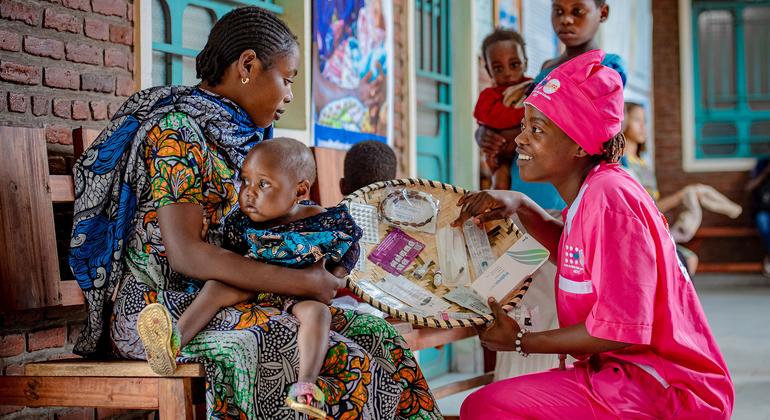The increased use reflects a major health success that has enabled millions of young people to avoid unintended pregnancy and exercise choice over their future, but UNFPA said that “for far too many, the basic human right to choose whether to have children remains undermined.”
‘Contraception saves lives’
The unavailability of contraception leads to an increase in unintended pregnancies and higher rates of maternal deaths as a result of unsafe abortions, according to UNFPA.
The consequences go far beyond health and contribute to increased teenage pregnancy, school dropout and increased risk of gender-based violence.
“Contraception saves lives”, reiterated Diene Keita, UNPA Executive Director.
In addition, they also provide significant financial benefits.
“Every $1 spent to end unmet need for contraception yields nearly $27 in economic benefits,” said Ms. Keita.
A peer educator talks to a group of commercial sex workers in Bangladesh about the benefits of using condoms.
Here are five common myths about birth control.
1. Contraception is unsafe
Modern forms of contraception are among the “most prescribed and well-studied” medicines available, according to UNFPA.
Health risks associated with unintended pregnancy are “significantly higher” than any recommended contraceptive method.
2. Using birth control can cause miscarriage
Contraceptives do not cause miscarriage or abortion; they work by preventing fertilization or ovulation – preventing pregnancy from happening in the first place.
3. Contraception damages your fertility
Contraceptives do not cause infertility. Some hormonal methods (such as injectable contraceptives) can temporarily delay the resumption of ovulation and menstruation, but this does not lead to permanent infertility.
4. Natural methods of family planning are safer than hormonal methods
Today, alternative birth control methods are becoming very popular on social media – cycle tracking methods, fertility awareness methods (ie daily temperature checks).
These “natural methods” are “significantly less likely to prevent pregnancy”, UNFPA stressed. “The most effective contraceptive methods are modern methods.”
5. You should not use birth control if you are single or if your partner does not want you to
Research shows that young people with access to information and services related to sexual and reproductive health do not increase their sexual activity.
Instead, it equips them with information to make responsible decisions.
“Every individual has the right to decide whether or not to become pregnant,” UNFPA said.
No one should ever be forced to have unprotected sex – a form of reproductive coercion that UNFPA has reiterated constitutes abuse.



